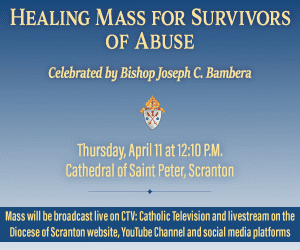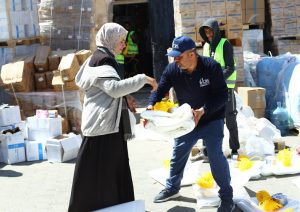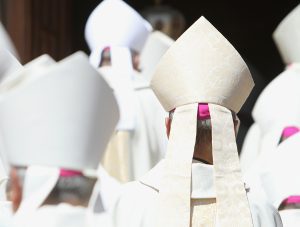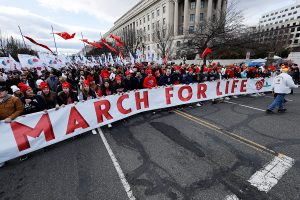(OSV News) – Wearing scrubs en route to the hospital to begin her day, a health care specialist was asked how much she knew about Caitlin Clark, the University of Iowa basketball superstar who has led her Hawkeye teammates — and by extension, all of “Hawkeye Nation” — to almost unprecedented acclaim in women’s basketball.
Not akin to assessing athletes and their acumen, she quickly and succinctly summarized Clark’s entrenchment in women’s basketball.

“That basketball that she dribbles and shoots and passes serves as a great metaphor for Caitlin Clark,” said the nurse. “The basketball is round, just like the world. And right now, Caitlin Clark has the world by her fingertips.”
That Clark has managed to permeate both the zealous and casual sports fan provides a testament to the level of her national impact at the young age of 22.
At this point, it’s an arduous task to cover new ground when it comes to Clark, a lifelong and reportedly devoted Catholic who attended St. Francis of Assisi parochial school in West Des Moines, Iowa, from kindergarten through eighth grade, and then spent four years at nearby Dowling Catholic High School.
Local reporters from Clark’s hometown have been sharing her exploits since the end of grade school. Clark wasn’t even a high school junior before national publications began pegging her as a can’t-miss collegiate standout. By the time she was a senior, the words “Caitlin Clark” had soared through the internet like an out-of-control locomotive with no definitive destination.
Those who have known Clark, however, said they never noticed any apparent change in her affable, comfortable, confident personality when early daily publicity — and subsequent almost-ridiculous national coverage last year and, in particular, the past few months — threatened to scrutinize every move Clark made both on and off the basketball court.
“She’s handled it as well as any 21- or 22-year-old could,” said Kristin Meyer, her high school basketball coach at Dowling, who somehow manages to cheerfully return countless phone calls from those researching Clark’s star-studded scholastic career.
“Her support system starts with her family. She doesn’t get caught up in fame or the business aspect,” Meyer said. “She was like that in high school. She didn’t look to seek attention. She didn’t spend much time on social media. She’s grounded. Humble.”
When Clark played in grade school, Meyer immediately noticed a “different type” of player. Clark’s improvement quickly skyrocketed, rising to uncommon heights.
To communally celebrate their 2020 alumna, the Dowling Catholic student council rented out a local theater April 1 to watch Clark in the Elite Eight that night. They weren’t disappointed after she scored 41 points and threaded 12 assists in a 94-87 win over Louisiana State University that earned a trip to the Final Four.
“It’s incredible,” said Meyer. “It’s still surreal … the level of notoriety to women’s basketball. It’s not all about Caitlin Clark, of course, but she is a part of it. As terrific a player as she was in high school, I can’t say I expected this level of success.
“Her court vision. Her understanding. I haven’t seen a higher IQ,” Meyer continued. “She’s fun to watch. She’s so consistent. Scores 30 or 40 against great teams. It’s an art. She can make it look effortless.”
Like Meyer, one of Clark’s grade-school mentors at St. Francis — sixth-grade math and science teacher Jill Westholm — recalls Clark’s kind, easygoing disposition as a youngster and has witnessed her former pupil’s ability to remain stable despite unlimited attention from fans, media and even curious bystanders who can’t quite make sense of Caitlin-mania.
“It’s so crazy to me to see her in this superstar world,” Westholm told OSV News. “The same Caitlin you see today is the same Caitlin who walked the halls as a 10-, 12- and 14-year-old. She’s the Caitlin Clark who is very smart. Intelligent. Very driven. The Caitlin Clark who never gave less than her best. The Caitlin Clark who was and is very loyal to her friends. The Caitlin Clark who, even in middle school, had their backs.”
A few months ago, Westholm and a few friends decided to purchase tickets to the NCAA women’s Final Four April 5-6 in Cleveland.
Figuring — correctly, as it turned out — that ticket prices could become unreasonable as the event approached, Westholm and her buds figured they were in win-win mode. The “worst” possibility would be sitting back and watching four great programs vie for the right to compete in the NCAA final.
The best scenario, however, was obvious.
“We gambled on Caitlin being there,” said Westholm. “We crossed our fingers and said some prayers.”
The prayers were answered. On April 5, Iowa met the University of Connecticut on the court in the Final Four, and Clark led the Hawkeyes’ rally for a 71-69 win over the Huskies. Iowa headed to the NCAA championship April 7 against undefeated South Carolina. The Gamecocks beat Iowa 87-75 for the national championship and completed a perfect season.
In an interview days before the final, Westholm predicted that regardless of Iowa’s fate, Clark would either either emerge eternally grateful for becoming a national champion, or quickly bounce back from any disappointment and recognize that she had been blessed to even be on the precipice of something so unique.
“She will rely on her faith,” said Westholm. “Her faith has always been important to her, and that’s real. Her whole family lives out their faith. Caitlin doesn’t reach her stardom without her family background.”
Westholm was referring to Clark’s parents, Anne and Brent, and her two brothers, Blake and Colin. Along with her siblings, Anne graduated from Dowling Catholic and her father, Bob Nizzi, coached football there.
Before graduating from Dowling in 2019, Blake became and remains involved with a club called Ut Fidem, Latin for “keep the faith.” Having experienced a Kairos retreat as a junior, Caitlin joined Ut Fidem as a senior.
The group’s focus, according to Dowling’s website, “strives to develop high school students into intentional disciples who will keep the faith for the rest of their lives, and especially through college” and supports students via weekly small groups of five or six led by adult faith mentors.
Students learn how to “defend their Catholic faith, and develop deep, personal relationships with Jesus Christ . . . grow their devotion to personal prayer, the sacramental life, understanding of church teachings, and enter into the lifestyle of an on-fire Catholic” and better understand how to discern the question, “Why am I Catholic?”
Using some of the tools she learned in grade school and high school and benefiting from a close, faith-sharing family, Clark recently started the nonprofit Caitlin Clark Foundation — described as a mission to “uplift and improve the lives of youth and their communities through education, nutrition and sport.”
Last November, Caitlin partnered with the Boys & Girls Clubs of Central Iowa and, with help from Nike, personally donated close to 100 hoodies, winter gloves and hats to help keep youngsters warm this past winter. Along with a sizable personal monetary donation, she also donated 57 basketballs, 15 footballs, 12 soccer balls and 15 jump ropes to the Boys & Girls Club.
“She uses her gifts to give back,” said Meyer. “She’s not bigger than the game of basketball, but she knows she has the capacity to help other people and is enthusiastic about doing as much as she can.”
Although it’s been argued that it’s actually her eye-popping passing ability that has separated her from former and current greats, Clark’s ascent from a consistently great scorer to tallying the most points in the history of college basketball didn’t happen out of nowhere.
From the time Clark decided to attend Iowa, the nation’s top coaches held their breath and readied themselves for a steady dose of nightly wonderment and more-than-occasional ESPN highlights.
No coach watched Clark more intently than Muffet McGraw.
The legendary Naismith Memorial Basketball Hall of Famer at the University of Notre Dame who retired in 2020 after an incredible career that included 936 total victories, a .762 winning percentage, nine trips to the Final Four, seven finals and two NCAA championships came within a whisker of coaching Clark.
After a painstaking decision process, however, Clark changed her mind at the last minute and chose Iowa black and gold over Irish blue and gold. Clark has gone on record as describing the phone call to McGraw as excruciating and lauds the coach for how she handled the disappointment with gentleness, compassion and understanding.
Not a person who dishes out unwarranted praise, McGraw, Notre Dame’s women’s basketball coach for 33 years, effusively commended Clark for helping elevate women’s basketball to its highest popularity ever among both the young and old, as indicated by the more than 12 million viewers who tuned in to watch the Iowa-LSU classic.
“I’ve never seen anyone like her,” McGraw told OSV News. “She is a phenomenal offensive player. She has confidence that never wavers. She’s fearless, relentless, competitive, driven … all the things that you want in a basketball player.
“And she’s also unselfish. Yes, she takes a lot of shots, but she also led the nation in assists last year, and I’m sure she’s in the top five this year. So she’s somebody that really knows how to get her team involved. She gets them to play at a higher level. She just has that charisma and that leadership that allows the people around her to thrive.”
Superstars sometimes can’t help but alienate teammates when all of the attention surrounds one person. But that hasn’t happened at Iowa.
“There could be jealousy and there could be problems in a situation like that when you have a player like that on your team,” said McGraw. “She makes them rise above everything and focus on just wanting to win. That’s, I think, the thing that sets her apart. It’s not all about her.”
McGraw particularly appreciates Clark’s vision that surpasses well beyond points, assists, rebounds, and championships.
“She wants to do something for the women’s game,” said McGraw. “She is certainly the center of attention, yet she always takes time for others. You see her signing autographs for lines and lines of people. She just does a great job in the community and continues to do whatever she can for the fans. She says the right things in public.
“I think she is definitely somebody that is a role model in our sport, and she’s changed the game,” McGraw continued. “I mean, nobody has done what she’s done in terms of the sellouts. The Big Ten sold out every single place. It’s unbelievable … unbelievable.
“The Big Ten tournament sold out for the first time,” she said. “Tickets for the last game were going for, I don’t know, $500 or something. It’s been amazing. I mean, 12 million people watched the Iowa-LSU game. That’s even more than a lot of NBA Finals. So it’s just phenomenal what she’s done for the game.”
Wherever Clark plays as a professional, McGraw will be watching.
“She’s one in a million,” said McGraw. “I think she’s going to do great things for the WNBA next year.”

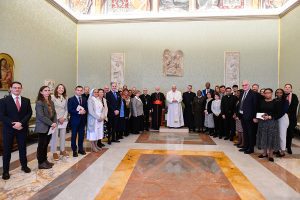
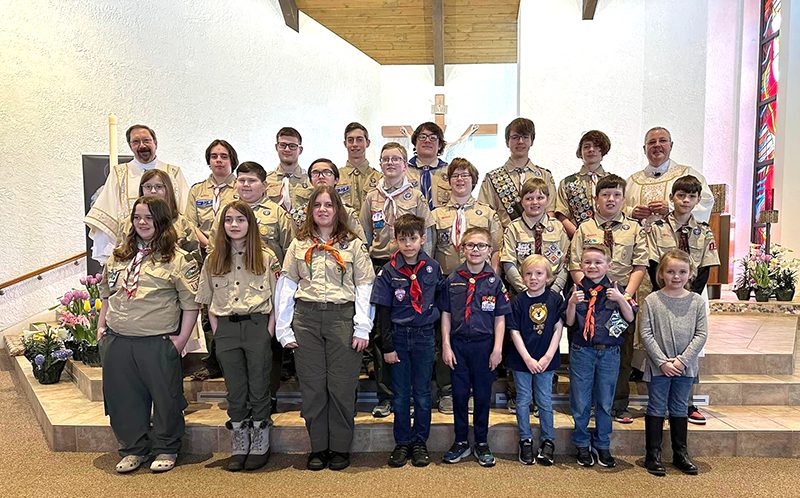 Living the scout oath
Living the scout oath